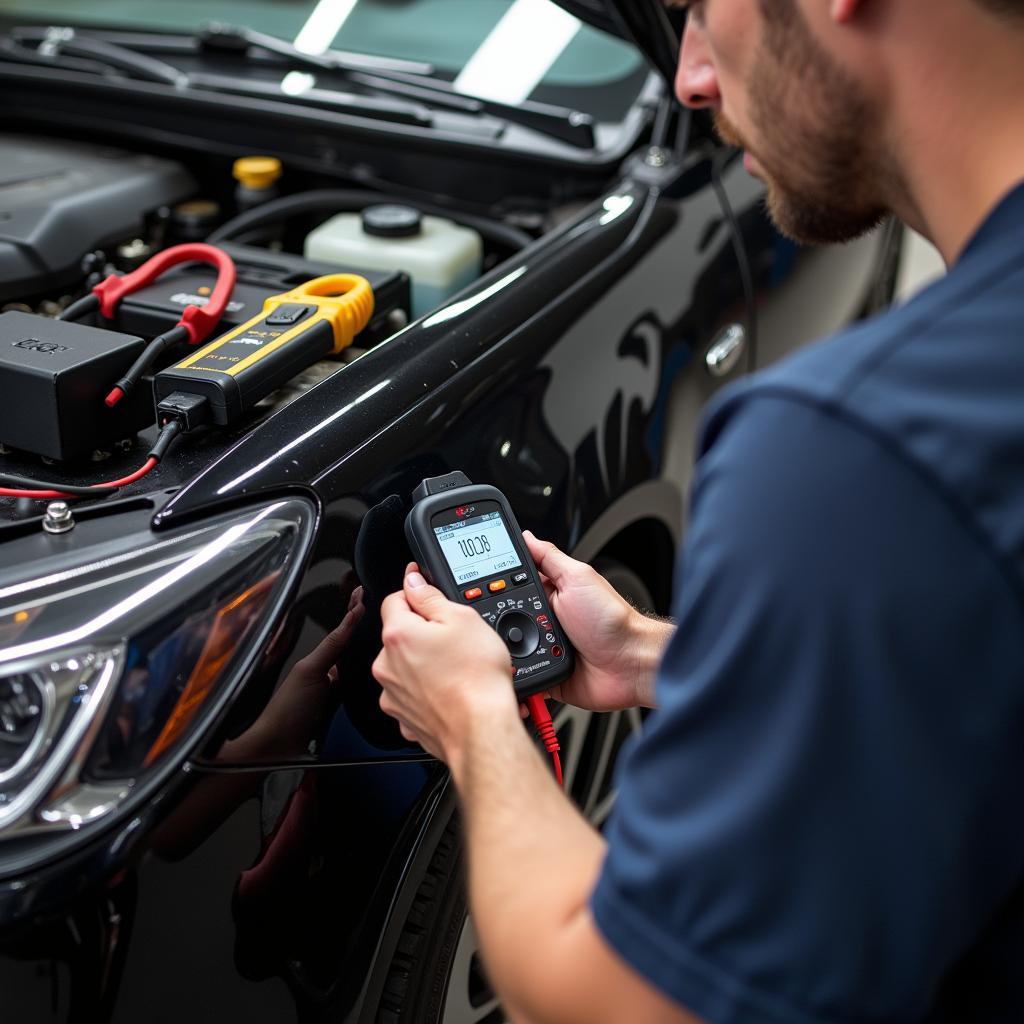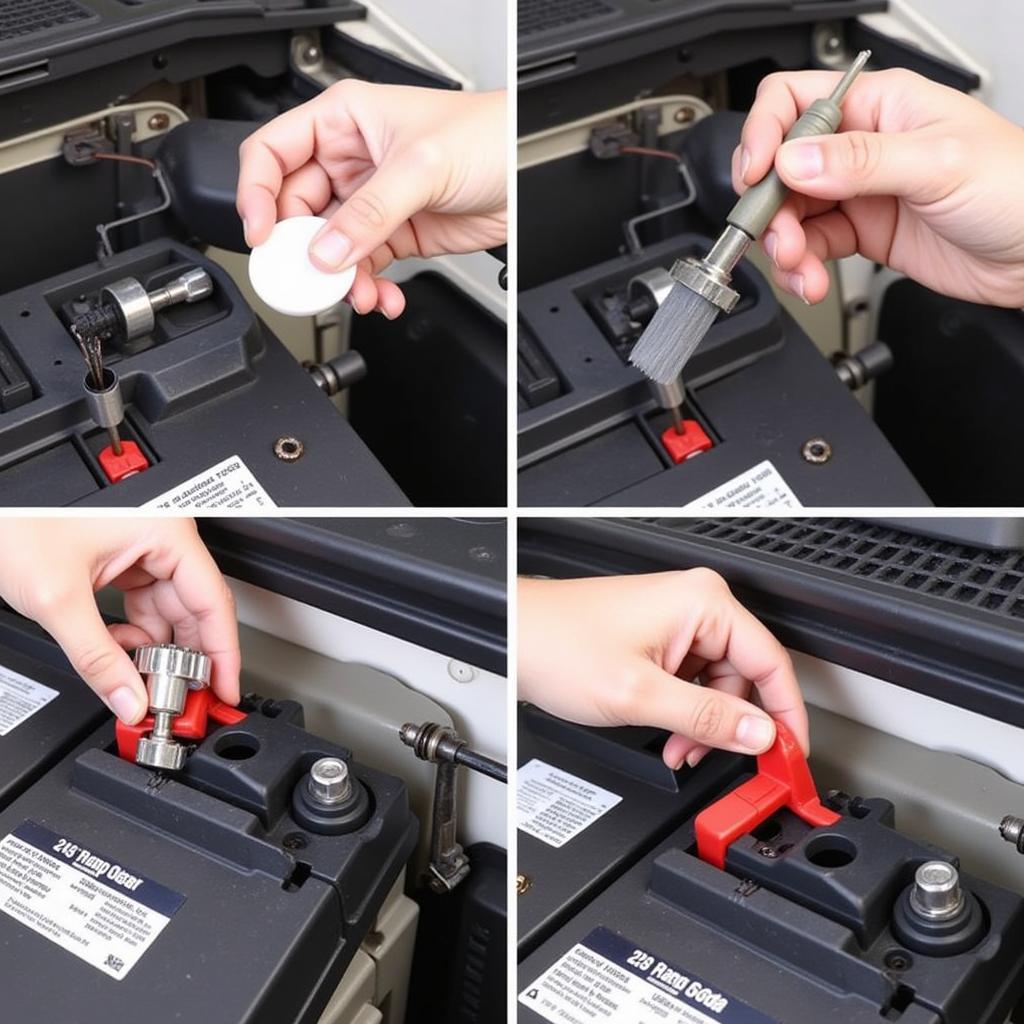Your car won’t start after disconnecting the battery? This is a surprisingly common issue, and while it can be frustrating, it’s often easily fixed. This guide will walk you through the most common causes and provide step-by-step solutions to get you back on the road.
Why Won’t My Car Start After Disconnecting the Battery?
Several reasons can explain why your car won’t start after a battery disconnect. It could be something as simple as a loose connection, a blown fuse, or a more complex issue like a triggered anti-theft system or a damaged ECU (Engine Control Unit). Understanding the potential culprits is the first step toward resolving the problem.
Common Causes and Solutions for a Car Not Starting After Battery Disconnection
Here’s a breakdown of the most frequent problems and their solutions:
- Loose or Corroded Battery Terminals: This is the most common culprit. Over time, battery terminals can corrode or become loose, disrupting the electrical connection.
- Inspect the terminals for any signs of corrosion (a white, powdery substance).
- If corrosion is present, clean it off with a wire brush and a baking soda and water solution.
- Ensure the terminals are tightly connected to the battery posts. Wiggle them to check for any looseness.
- Blown Fuses: Disconnecting and reconnecting the battery can sometimes cause a surge that blows a fuse.
- Locate your car’s fuse box (usually under the dashboard or in the engine compartment).
- Consult your owner’s manual to identify the fuse related to the starting system.
- Check the fuse for a broken filament. If broken, replace it with a fuse of the same amperage.
- Triggered Anti-theft System: Modern cars often have sophisticated anti-theft systems that can be activated when the battery is disconnected. This can prevent the car from starting.
- Try locking and unlocking your car with the key fob.
- Consult your owner’s manual for specific instructions on how to reset your car’s anti-theft system. This often involves a specific key-turning sequence or a combination of button presses on the key fob.
- Resetting the ECU: Sometimes, disconnecting the battery can reset the ECU, which controls the engine’s functions. This might require a relearning process before the car starts.
- Try leaving the ignition on for a few minutes, then try starting the car.
- If this doesn’t work, you may need professional diagnostic tools to reprogram the ECU.
- Parasitic Drain: A parasitic drain occurs when something in your car’s electrical system continues to draw power even when the car is off. This can drain the battery even when disconnected and reconnected.
- If you suspect a parasitic drain, consult a qualified mechanic to diagnose and fix the issue.
What if My Car Still Won’t Start?
If you’ve tried all these solutions and your car still won’t start after disconnecting the battery, it’s time to seek professional help. A qualified auto electrician can diagnose the problem using specialized diagnostic equipment and perform the necessary repairs.
 Automotive Diagnostic Equipment for Car Starting Issues
Automotive Diagnostic Equipment for Car Starting Issues
Conclusion
Dealing with a car that won’t start after disconnecting the battery can be a hassle. However, by understanding the common causes and following the troubleshooting steps outlined in this guide, you can often resolve the issue yourself. If the problem persists, seeking professional assistance is always the best course of action to avoid further complications and get your car back on the road quickly.
FAQs
-
How long should I wait before trying to start my car after reconnecting the battery? Usually, a few minutes is enough for the ECU to reset.
-
Can disconnecting the battery damage my car? Generally, no. However, it can reset certain settings like radio presets and clock. In some rare cases, it can cause issues with sensitive electronic components.
-
Do I need any special tools to reconnect a car battery? Usually, just a wrench is needed to tighten the terminals.
-
Will disconnecting the battery clear any error codes? Yes, disconnecting the battery can temporarily clear error codes, but if the underlying problem persists, the codes will return.
-
Why is it important to clean the battery terminals? Clean terminals ensure a good electrical connection, preventing starting problems and other electrical issues.
-
What is the most common reason for a car not starting after battery disconnection? Loose or corroded battery terminals are the most common culprit.
-
Can a dead battery cause a car not to start even after disconnecting and reconnecting it? Yes, a dead battery needs to be recharged or replaced before the car can start, even after disconnection and reconnection.


